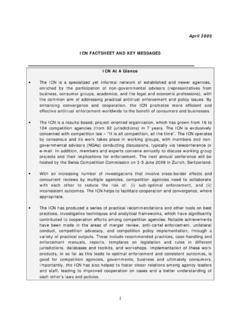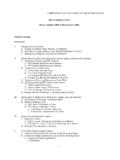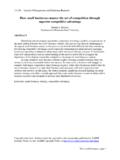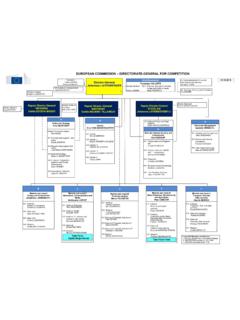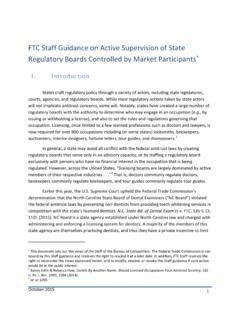Transcription of Competition Law and Policy in the Russian Federation
1 Competition Law and Policy in the Russian Federation 2013 This report on Competition Law and Policy in the Russian Federation was prepared to assist the OECD Competition Committee in assessing the willingness and ability of Russia to assume the obligations of OECD membership. In doing so, the Competition Committee assessed the degree of coherence of Russia s Competition law and Policy with that of OECD Member countries. This report, prepared as part of OECD accession review, highlights some of the key challenges facing Russia in the field of Competition Policy . Russia Peer Review of Competition Law and Policy (2004) Competition LAW AND Policy IN THE Russian Federation -- 2013 -- ORGANISATION FOR ECONOMIC CO-OPERATION AND DEVELOPMENT The OECD is a unique forum where the governments of 34 democracies work together to address the economic, social and environmental challenges of globalisation. The OECD is also at the forefront of efforts to understand and to help governments respond to new developments and concerns, such as corporate governance, the information economy and the challenges of an ageing population.
2 The Organisation provides a setting where governments can compare Policy experiences, seek answers to common problems, identify good practice and work to co-ordinate domestic and international policies. The OECD member countries are: Australia, Austria, Belgium, Canada, Chile, the Czech Republic, Denmark, Estonia, Finland, France, Germany, Greece, Hungary, Iceland, Ireland, Israel, Italy, Japan, Korea, Luxembourg, Mexico, the Netherlands, New Zealand, Norway, Poland, Portugal, the Slovak Republic, Slovenia, Spain, Sweden, Switzerland, Turkey, the United Kingdom and the United States. The Commission of the European Communities takes part in the work of the OECD. OECD Publishing disseminates widely the results of the Organisation s statistics gathering and research on economics, social and environmental issues, as well as the conventions, guidelines and standards agreed by its members. This work is issued under the responsibility of the Secretary-General of the OECD.
3 The opinions expressed and arguments employed herein do not necessarily reflect the official views of the OECD member countries. OECD 2013 You can copy, download or print OECD content for your own use, and you can include excerpts from OECD publications, databases and multimedia products in your own documents, presentations, blogs, websites and teaching materials, provided that suitable acknowledgment of OECD as source and copyright owner is given. All requests for public or commercial use and translation rights should be submitted to Requests for permission to photocopy portions of this material for public or commercial use shall be addressed directly to the Copyright Clearance Centre (CCC) at or the Centre fran ais d exploitation du droit de copie (CFC) Competition LAW AND Policy IN THE Russian Federation OECD 2013 3 FOREWORD This Report on Competition Law and Policy in the Russian Federation is part of a series of reviews of national policies undertaken for the OECD Competition Committee.
4 It was prepared to assist the OECD Competition Committee in its assessment of the willingness and ability of the Russian Federation to assume the obligations of membership in the OECD concerning Competition Policy . Economic Competition has developed significantly over the past two decades and considerable progress has been achieved in establishing the necessary framework for Competition in Russian Federation . However, when it comes to implementation of the new laws and policies through administrative and judicial decisions, the speed and scale of the changes give rise to potential risks. These and other key challenges facing Russia in its implementation and enforcement of Competition Policy are highlighted in this report. It reflects the situation as of June 2013. The report is released on the responsibility of the Secretary General of the OECD. This review was prepared by Sally van Siclen and Sarah Reynolds under the supervision of the Competition Division of the OECD Directorate for Enterprise and Financial Affairs.
5 Competition LAW AND Policy IN THE Russian Federation OECD 2013 5 TABLE OF CONTENTS Executive Summary 7 Introduction 11 1. Foundations and history of Competition Policy 11 Early history and development 12 Recent developments and current priorities 15 2. Substantive matters: content of the Competition law 18 Exemptions generally 19 Restrictive agreements and concerted practices 20 Dominance and monopolization 39 Concentration control 60 Unfair Competition 70 Acts of state bodies and officials, transfer of rights in state property and natural resources 72 State and municipal preferences (state aids) 78 State purchasing 81 Economics-based assessments 83 3. Institutional issues: enforcement structures and practices 90 Competition Policy institutions 90 Competition law enforcement 94 Other enforcement methods 101 International issues and cooperation in Competition law enforcement 102 Competition and international trade and investment 106 Competition body resources and caseload 108 4.
6 Limits of Competition Policy : Exemptions and Special Regulatory Regimes 113 Economy-wide exemptions and special treatment 113 Regulation and reform of natural monopolies 115 General Scheme 117 Electricity 121 6 Competition LAW AND Policy IN THE Russian Federation OECD 2013 Natural gas 123 Petroleum products and pipelines 124 Rail transport 125 Air transport 126 General observations about natural monopoly regulation 128 Other sector-specific rules and exceptions 130 Conformity with Guiding Principles for Regulatory Quality and Performance and Recommendation of the Council on Competition Assessment 140 5. Competition Issues in Regulatory and Legislative Processes 143 Competition advocacy in legislative and regulatory process 143 Government Action Plan (Roadmap) for the Promotion of Competition and Improvement of Antimonopoly Policy 146 Expert councils and other public involvement 149 Competition advocacy and public information 150 6. Assessment and conclusions 152 Current conditions and trends over 5-10 years 153 Implementation of the Six Roadmap Principles 155 References 167 Boxes Box 1.
7 New methods in cartel investigations yield evidence of intent 29 Box 2. Cases involving public procurement 31 Box 3. Examples of Formal Cautions 33 Box 4. Proper pricing models for dominant enterprises 51 Box 5. Defining Necessary profit 52 Box 6. Cases of abuse of joint dominance 53 Box 7. Selective distribution in pharmaceuticals 57 Box 8. Dominance of a dairy 57 Box 9. Merger Case Examples 64 Box 10. Review of conditions imposed for merger approval 66 Box 11. Practice in unfair Competition and advertising cases 71 Box 12. Practice in state actions cases 76 Box 13. Violation of Article 17 78 Box 14. Bread, petroleum products and compulsory insurance 83 Box 15. Competition violation in retail trade 139 Box 16. Typical examples of published merger decisions 151 Competition LAW AND Policy IN THE Russian Federation OECD 2013 7 Executive Summary The development of economic Competition is a pervasive and fundamental part of the transformation of the Russian Federation over the past two decades.
8 Today, the role of Competition is recognised across a range of government policies, from anticorruption to public procurement, and competitive mechanisms are required for procurement, for award of use rights in important natural resources and for the sale or use of most forms of public property. Despite strong support for Competition in the 1993 Constitution and laws other than the Competition law, Competition was not a high priority during much of the 1990s and later. The Federal Antimonopoly Service ( FAS ) is well-positioned within government. It is directly subordinate to the head of the Government and has its own funding and staff. It plays a central role in the Government s response to various economic issues such as price spikes in socially important goods, on-going reform of natural monopolies and promotion of fair public procurement as well as advocacy for Competition on other matters. FAS enforces the Competition law as well as the laws on public procurement, advertising, trade (in wholesale food markets, for example) and others.
9 The Competition law deals with restrictive agreements, abuse of dominance, mergers, unfair Competition , Competition restrictions by public authorities and state or municipal preferences (state aid), without sectoral exceptions. In outline, the content is roughly similar to the laws of many OECD countries, with the exception that the law covers actions by public authorities. However, details in the law may sow the seeds for the development of a very distinctive law. In particular, the definitions of signs of restricting Competition and of monopolistically high and monopolistically low prices have led in some instances to a rigid understanding of lawful market conduct. Important changes in the Competition law and related legislation in the past six years include expanding the geographic scope of coverage, distinguishing cartels from other sorts of restrictive agreements, raising merger filing thresholds, placing merger review procedures into the law, substantially increasing administrative sanctions in the form of turnover-based fines, expanding the ability to undertake investigations, and instituting a leniency program.
10 The introduction of warnings and the adoption of non-discriminatory access rules for natural monopolies and their infrastructure may facilitate Competition rule enforcement towards dominant firm conduct. The structural reform of natural monopoly sectors has often been limited. It has often been limited to the separation of state functions from commercial functions, and the latter separated into distinct legal entities within a single group of companies. The major exception is the electricity sector, where there has been ownership separation. Non-discriminatory access rules to natural monopolies and their infrastructure are in place in many important sectors. Natural monopolies tariffs are regulated by the tariff regulator while overall sectoral Policy is the responsibility of sectoral ministries and the 8 Competition LAW AND Policy IN THE Russian Federation OECD 2013 Government. This arrangement leaves FAS with a large caseload in applying the Competition law to non-pricing conduct of natural monopolies.











